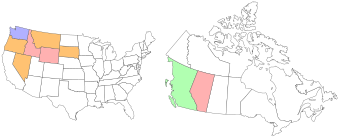|
Duffy
|
 |
« on: November 18, 2010, 04:22:33 PM » |
|
OK thanks to those that helped me learn about the multimeter (including how not to use it) last week. Just back from Pep Boys where they tested my battery (after being on the charger for a couple days) at 225 amps and 12 volts. They assured me the battery is good. Came home hooked it back up, still no power to anything. Set multimeter (mm) to ohms and touched neg battery line with one probe and frame with the other and nothing; no continuity. What does that tell me? Next steps? Thanks in Advance.   |
|
|
|
|
 Logged
Logged
|
|
|
|
|
sandy
|
 |
« Reply #1 on: November 18, 2010, 04:50:24 PM » |
|
I found the same problem on a friend's Valk. I replaced his ground cable. No more issues. His bike had come from a cold damp climate. The cable had corroded through inside the insulation. It looked good but no connection.
|
|
|
|
|
 Logged
Logged
|
|
|
|
|
Bone
|
 |
« Reply #2 on: November 18, 2010, 05:04:04 PM » |
|
If it is a ground cable clamp a auto jumper cable from the battery to a good place on the bike. My curiosity is killing me  |
|
|
|
|
 Logged
Logged
|
|
|
|
gordonv
Member
    
Posts: 5766
VRCC # 31419
Richmond BC
|
 |
« Reply #3 on: November 18, 2010, 05:11:45 PM » |
|
Came home hooked it back up, still no power to anything. Set multimeter (mm) to ohms and touched neg battery line with one probe and frame with the other and nothing; no continuity.
It's been a while since I used a regular meter for testing, my digital meter has a continuity setting with audio for that. Make sure that both ends of the positive/negative leads are cleaned (if you have a problem with one side, you may have another problem soon with the other too). Remove from the bike (the ends, you don't need to remove the pos wire from the frame), clean each end, and then test each removed wire for continuity. When you connect them back, use dielectric grease. |
|
|
|
|
 Logged
Logged
|
1999 Black with custom paint IS   |
|
|
|
Thunderbolt
|
 |
« Reply #4 on: November 18, 2010, 05:16:22 PM » |
|
connection point. Tighten the bolt that you find at the end of the wire. Or do what was suggested, take one cable of your jumper cables, black if you are a purist and connect one end to the negative post of the battery and the other to a bolt that is screwed into the frame. Crank the bike.
If you put the two wires from your multimeter together do you have continuity? Maybe one of them is defective.
|
|
|
|
|
 Logged
Logged
|
|
|
|
|
Duffy
|
 |
« Reply #5 on: November 18, 2010, 05:26:19 PM » |
|
Based on Sandy's comment, I tested and found continuity from the neg cable at battery to the neg cable connection at the (is that the alternator?) I am interpreting that to mean the cable is good. Would you agree? I'll try the jumper cable idea now... no, that didn't do anything.  |
|
|
|
|
 Logged
Logged
|
|
|
|
|
Duffy
|
 |
« Reply #6 on: November 18, 2010, 05:29:28 PM » |
|
Dielectic grease?   Don't have any of that.  Cables look clean on each end. I did remove the battery and rehook it up. Connections at the battery look fine, no corrosion. |
|
|
|
|
 Logged
Logged
|
|
|
|
|
Bone
|
 |
« Reply #7 on: November 18, 2010, 05:43:00 PM » |
|
Based on Sandy's comment, I tested and found continuity from the neg cable at battery to the neg cable connection at the (is that the alternator?) I am interpreting that to mean the cable is good. Would you agree? I'll try the jumper cable idea now... no, that didn't do anything.  Continuity doesn't necessarily mean the cable is good. One strand of wire would show continuity. The jumper cable would make sure you have continuity and capacity and would eliminate the cable as a problem. |
|
|
|
|
 Logged
Logged
|
|
|
|
|
Thunderbolt
|
 |
« Reply #8 on: November 18, 2010, 05:49:21 PM » |
|
under the right side cover? It's usually under a rubber cover behind the starter solenoid. Check the fuse with your multimeter set to Ohms. Look where it plugs in for burned or corroded connection points or burned wiring. If this fuse is open or wiring burned open, you won't get any power to anything.
|
|
|
|
|
 Logged
Logged
|
|
|
|
|
Duffy
|
 |
« Reply #9 on: November 18, 2010, 06:05:28 PM » |
|
I disconnected the neg battery cable and confirmed continuity from one end to the other. (Now I know the south end of that cable connects/grounds to the engine block below the alternator and does not actually connect to the alternator.  ) Double checking fuses.. |
|
|
|
|
 Logged
Logged
|
|
|
|
|
Duffy
|
 |
« Reply #10 on: November 18, 2010, 06:24:49 PM » |
|
WE HAVE A WINNER!  Thunderbolt! How Ironic the name... YOU ROCK  The green 30 a fuse under the red covers and behind something is blown on the right side. Not sure why, but was using Gerbings earlier the day it blew. Yes, I know I said I checked the fuses and I did, all the ones I could find. That 30 amp one is pretty well covered up if you don't know what you are looking for. |
|
|
|
|
 Logged
Logged
|
|
|
|
|
Duffy
|
 |
« Reply #11 on: November 18, 2010, 06:34:53 PM » |
|
Well it is after 9 pm and Pep Boys is closed for the night so I will get a new 30A fuse tomorrow. Cool. Thanks to ALL helping me track down the problem and of course especially Thunderbolt for causing me to hunt for a 30A fuse I hadn't found. ALL Y'all Rock!    |
|
|
|
|
 Logged
Logged
|
|
|
|
|
Bone
|
 |
« Reply #12 on: November 18, 2010, 06:46:07 PM » |
|
Good find.
Trouble shooting can be fun. Sometimes we find things close to being a problem. Better in the garage than on the road.
|
|
|
|
|
 Logged
Logged
|
|
|
|
|
Duffy
|
 |
« Reply #13 on: November 18, 2010, 08:48:35 PM » |
|
So I have learned a lot, and again thanks.  Now I see that there is a "Main Fuse" on page 17-0 of the manual, 30A, that was it between the battery and the ignition switch. Good to know.  I had checked the fuses I had found, several 10As and the big 55A, which I thought was the "main fuse". I don't see that "fuse" in the diagram. It is different thatn the rest, not incased in plastic of a certain color, just a piece of metal between screws. Now I see on page 16-0 that the 55A is the "Alternator Fuse." Well what do you know.  Any thoughts on why that happened? Is it a clue that there is another problem - maybe? |
|
|
|
« Last Edit: November 18, 2010, 08:51:17 PM by Duffy »
|
 Logged
Logged
|
|
|
|
|
Thunderbolt
|
 |
« Reply #14 on: November 19, 2010, 03:59:06 AM » |
|
if it is blown, be sure to check the connections where it plugs in for overheating. Get a spare and keep it on the strap over the battery.
Running Gerbings and extra lights might have done it, run your Gerbings through a fuse connected directly to your battery.
|
|
|
|
|
 Logged
Logged
|
|
|
|
|
Pete
|
 |
« Reply #15 on: November 19, 2010, 05:58:27 AM » |
|
If you really suspect the heated riding gear or lights, then you should check the current draw on the riding gear and lights.
As blowing a 30 amp fuse is SIGNIFICANT current draw.
You will need an amp meter to test. Wire the amp meter between the battery and the devices drawing current, turn them on and read the current draw.
|
|
|
|
« Last Edit: November 19, 2010, 01:36:17 PM by Pete »
|
 Logged
Logged
|
|
|
|
|
Baloo
|
 |
« Reply #16 on: November 19, 2010, 01:22:51 PM » |
|
Glad you found it!  This is what I love from the VRCC. You can come around here with a problem and no clue on how to solve it and there is always a bunch of folks trying to help you. You now know your Valk a little bit better and if ever you have that kind of problem again, you'll be in good position to find the trouble. Cheers! |
|
|
|
|
 Logged
Logged
|
Never ride any faster than your guardian angel can fly...
|
|
|
|

